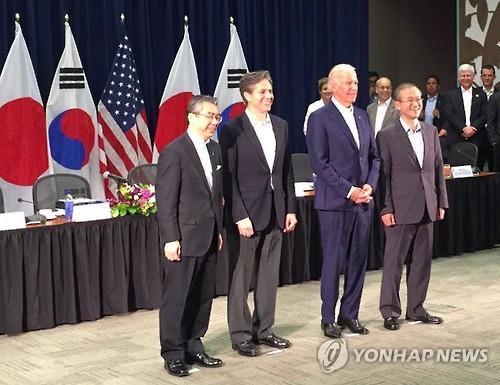- California Assembly OKs highest minimum wage in nation
- S. Korea unveils first graphic cigarette warnings
- US joins with South Korea, Japan in bid to deter North Korea
- LPGA golfer Chun In-gee finally back in action
- S. Korea won’t be top seed in final World Cup qualification round
- US men’s soccer misses 2nd straight Olympics
- US back on track in qualifying with 4-0 win over Guatemala
- High-intensity workout injuries spawn cottage industry
- CDC expands range of Zika mosquitoes into parts of Northeast
- Who knew? ‘The Walking Dead’ is helping families connect
S. Korea, U.S., Japan condemn N. Korea’s nuclear, missile provocations
SEOUL/HAWAII, July 15 (Yonhap) — The No. 2 diplomats from South Korea, the United States and Japan strongly condemned North Korea’s nuclear and missile provocations as they agreed to step up cooperation for the North’s denuclearization, Seoul’s foreign ministry said Friday.
The agreement came during a trilateral meeting between South Korean First Vice Foreign Minister Lim Sung-nam, U.S. Deputy Secretary of State Antony Blinken and Japanese Vice Foreign Minister Shinsuke Sugiyama in Honolulu, Hawaii, on Thursday (local time), the ministry said in a press release.
“Its nuclear and missile provocations pose a serious threat to peace and security in the region,” Lim said at a joint press conference held after the meeting.
“While strongly condemning these blatant violations of international obligations by North Korea, we have agreed to further strengthen our trilateral cooperation and policy coordination to counter these repeated provocations,” he added.
Lim added that the three also agreed to take “additional measures leading to tougher sanctions and further isolation of North Korea” should it conduct another strategic provocation.

South Korea’s Vice Foreign Minister Lim Sung-nam (R) poses next to U.S. Vice President Joseph Biden along with his two counterparts from Washington and Japan after holding a trilateral meeting in Hawaii on Thursday.
“In this context, we shared the need to continuously implement U.N. Security Council resolutions in a faithful manner with other members of the international community,” he said.
“We seek to actively work together to deliver to North Korea a clear, firm and united resolve of the international community at future multilateral meetings,” he noted.
As for the recently reached decision by South Korea and the United States to deploy an advanced missile defense system on the peninsula, Blinken made clear that the move is not aimed at a third country, apparently trying to alleviate concerns raised by some neighboring countries, including China.
Seoul and Washington announced Wednesday that they will deploy the Terminal High Altitude Area Defense (THAAD) system in a small town located in the southern part of the country.
The decision was made despite strong objections from China and Russia, which have expressed concerns that such a development will hurt their strategic security interests.
Blinken said that the United States will keep taking necessary measures to protect its allies in the face of evolving nuclear and missile capacity of the North.
“We have been working very hard to support Japan and Korea as they increase and strengthen their own defense capabilities, and we’re doing this increasingly not just on a bilateral basis but trilaterally,” he said during the press conference.
“We have been very clear that as long as the threat is there, we will take every necessary step to defend our people, to defend our countries, to defend the alliance that we share,” he added.
Praising Washington’s recent move to impose sanctions on North Korean leader Kim Jong-un for human rights violations, the three officials also agreed to explore “creative” and “effective” measures that could increase pressure on the North related to the issue, the ministry said.
Meanwhile, United States Vice President Joe Biden said in a speech before the start of the trilateral meeting that the three countries share the same vision for the Asia-Pacific region, expressing hopes that their cooperation will keep improving going forward, the ministry said.
Biden was also quoted as saying that Washington is committed to strengthening its alliance with South Korea and Japan which are considered to be the backbone of its Asia-Pacific rebalancing strategy for which the U.S. has been making a strong push.











